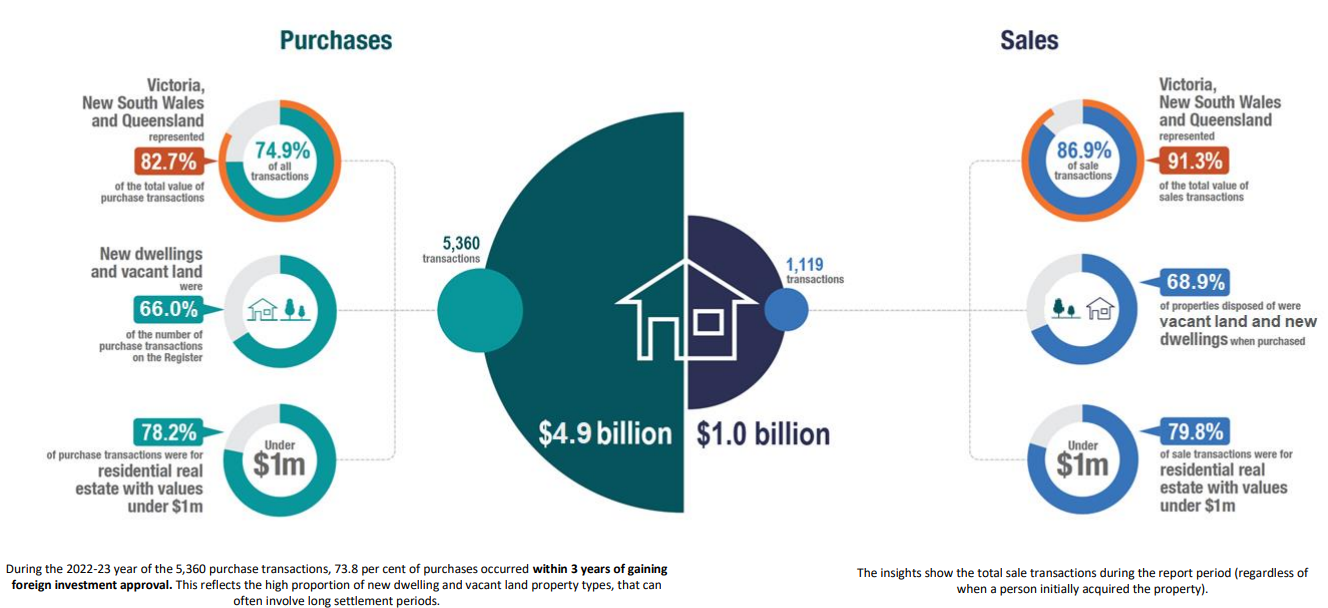Last week, I reported on a new UTS survey showing that Australians have become increasingly antagonistic toward Chinese investment in Australian property.
The survey showed that only 28% of Australians believe that Chinese investment in Australian residential property delivers material benefits for Australians, such as construction, new dwellings, jobs, etc. This represented a four-year low.
The overwhelming majority of Australians (80%) also believed that ‘Foreign buyers from China drive up Australian housing prices’, which was a seven-point increase from 2023 (73%), and almost matched the 82% high recorded in 2021.
Nearly three-quarters (74%) of Australians also believed that ‘Chinese investors have negatively affected the rental market for residential real estate in Australia’, a six-point rise from 2023 (68%) and a four-year high.
Advertisement
The overwhelming majority (83%) of Australians also believe that ‘Australia should restrict the amount of investment in residential real estate that is permitted from Chinese investors’, which was a four-year high.
Growing anxiety among Australians stems from regular media reports of Chinese buyers paying exorbitant prices for established Australian properties (see example below).
Advertisement
Right down the East Coast, real estate agents have reported a large rise in Chinese buyers splashing cash on Australian homes.
Late last year, Juwai IQI spokesperson, David Platter, said the firm had “been working with a lot of Chinese ever since the borders opened. Presumably as flights continue to increase we will see buying increase”.
“These people are upper-middle-class and wealthy from a Chinese standpoint. They are buying townhouses, houses and large apartments at $1.5 million, $2 million, $2.5 million and up”.
Advertisement
On Friday, the Foreign Investment Review Board (FIRB) released data for the final quarter of 2023 confirming that foreign residential property investment has risen, led by China.
“The number of residential real estate investment proposals approved was 1,580 with a total value of $1.9 billion”, FIRB says.
“China was the largest source for approved residential real estate investment proposals by number and value ($0.8 billion), followed by Hong Kong SAR ($0.1 billion), India ($0.1 billion), Vietnam ($0.1 billion), and Taiwan ($0.1 billion)”.
Advertisement
According to the FIRB, Chinese investors purchased 2601 residential homes totalling $3.4 billion in the 2022-23 financial year, up from 2317 homes worth $2.4 billion in 2021-22.
Separate data published by the Australian Taxation Office (ATO) on Friday also showed that “across Australia, [foreign] purchase transactions increased by 26.8%”.
“From 1 July 2022 to 30 June 2023 there were 5,360 residential real estate purchases with a level of foreign ownership. The total value of these purchase transactions was $4.9 billion”, the ATO reported.
“The total number of residential real estate sale transactions by foreign persons for the period 1 July 2022 to 30 June 2023 was 1,119, with a total value of $1.0 billion”.
Advertisement

Source: ATO
As shown above, NSW, Victoria and Queensland dominated activity from foreign buyers.
“Victoria, New South Wales and Queensland represented 74.9% of all purchase transactions and make up 82.7% of the total value of purchase transactions recorded on the Register for the 2022–23 period”, the ATO said.
Juwai IQI’s co-founder and group managing director, Daniel Ho, commented that the 27% increase showed that “overseas buyers were bouncing back after the travel slowdown during the pandemic”.
Advertisement
“Why do foreign buyers like Australia? They appreciate Australia’s strong economy, good education system, and attractive lifestyle”, he said.
The federal government should prohibit temporary residents from buying established Australian properties.
Implementing a ban on temporary residents would return the regulations to what existed before the Global Financial Crisis (GFC). That is, before the Rudd government irresponsibly opened up the existing housing market to temporary residents in 2009.
Advertisement
Australia must also apply Tranche 2 global anti-money laundering (AML) requirements for real estate gatekeepers such as agents, lawyers, and accountants.
Australia has delayed the adoption of these global AML regulations for around 15 years, making Australian housing a magnet for dirty foreign money and contributing to rising home prices.

